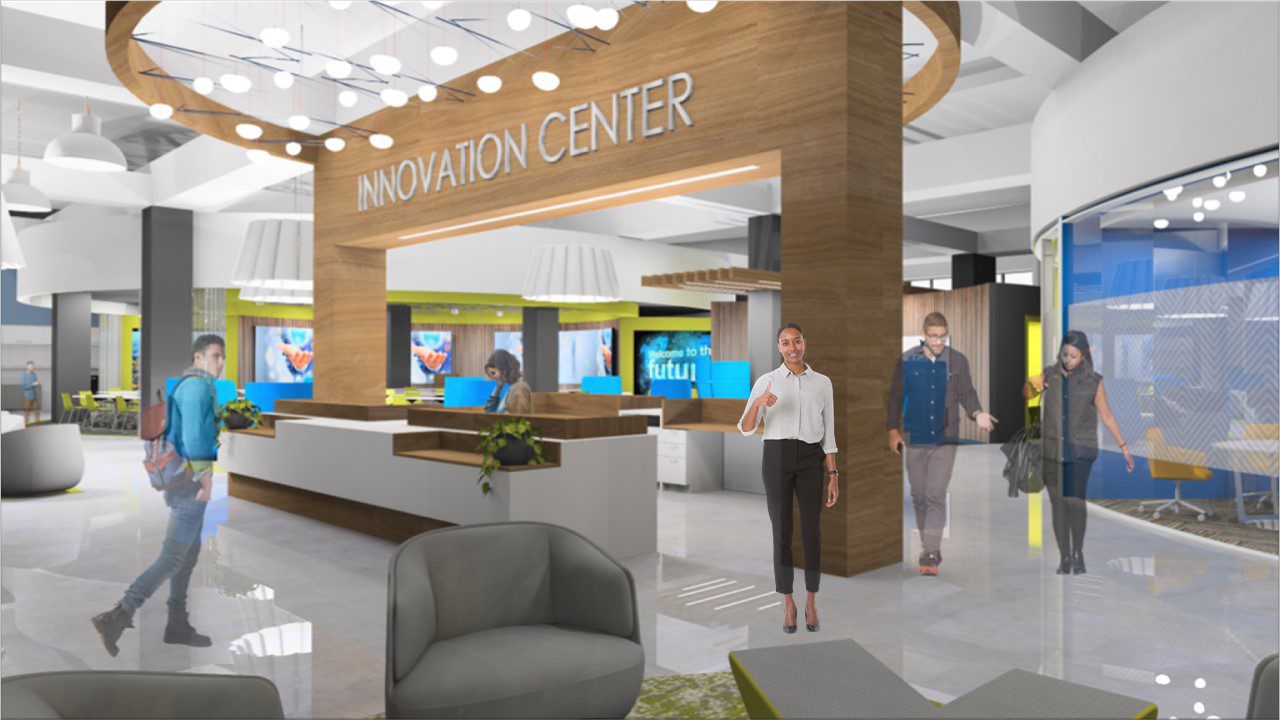Riley Kaminer
This summer, Nova Southeastern University is set to open the doors of its Alan B. Levan NSU Broward Center of Innovation. NSU hopes that its Center (pictured in renderings here) will be a hub for the South Florida entrepreneurial ecosystem.
The high-tech center – a 54,000-square-foot space on the top floor of NSU’s Alvin Sherman Library on its Davie campus – will contain offices and open work area, lecture halls and event spaces, a cybersecurity training range, a media studio, and a modular auditorium able to fit 500 guests.
The Center is already working to fulfill its mission to become an economic development engine by organizing a series of virtual panel discussions on innovation.

Dr. John Wensveen, the Center’s Executive Director, moderated the first event of this series, “State of the Global Startup Ecosystem.” The panel included experts from three continents with backgrounds spanning from higher education to entrepreneurship to investment banking.
We’ve summarized the top three insights from these global experts.
Innovation is more than a buzzword: It’s the future
Susan Amat, Executive Director of GEN Accelerates and also founder and CEO of Venture Hive based in Miami, described innovation as “adding value by making something new.” Danny Lopez, CEO of cybersecurity firm Glasswall Solutions, went one step further with his view of innovation as creating “incremental value by doing something different.”
But where exactly does innovation come from?
George Northcott, Co-Founder & Vice President at Founders Factory, underscored the importance of access to “spaces like this,” NSU’s Center of Innovation, to “bring stakeholders together.”
Barbara Iyayi, CEO of Unicorn Growth Capital, signaled the importance of timing, suggesting that innovation “comes out of crises, like what we’re facing now.” She argued that crises like pandemics make innovators “constantly change their way of thinking, leading to new ideas.” Quite a silver lining!
FinTech, Cybersecurity, and Healthcare are the top startup sectors to watch in 2021
Startups today are active across an unprecedented number of sectors, but the experts agreed that FinTech shows some of the most potential of any vertical. According to the panelists, the rise of new technologies, the lack of innovation from legacy financial firms, and consumers’ increasing appetite for cutting-edge products – spurred by the pandemic – will all contribute to FinTech’s growth in 2020.
Iyayi highlighted the opportunities for FinTech in Africa, where innovations such as cryptocurrency and blockchain have gained major traction. Lopez emphasized the need for strong cybersecurity practices to combat potential threats to FinTech systems.
Healthcare was another sector that the experts signaled to watch in 2021 – particularly relevant as consumers and governments look to recover from the coronavirus pandemic. Northcott noted that direct to consumer healthcare solutions will be particularly sought after, considering the recent rise in technologies such as telemedicine.
Investors and entrepreneurs should think globally
The panelists urged participants in local startup ecosystems to take a global perspective.
David Ponraj, CEO of Southwest Florida-based Startup Space, revealed that “the markets that excite [him] the most are Africa and Asia” because “developing countries are pushing innovation.” According to Ponraj, these markets are pushing innovation because of the more widespread use of advanced technologies like mobile-first banking, which allows entrepreneurs to “skip multiple iterations of a product lifecycle and just to go to where the solution is.”
Iyayi echoed Ponraj’s sentiments, noting that she has heard “lots of interest from the global community to get involved in the African tech ecosystem,” particularly from a FinTech perspective.
For countries and companies to take advantage of this internationalization, Northcott argued that it is important to “create incentives for talent to move to a certain ecosystem.” He gave the example of Estonia, a small country with a very developed digital government, which offers digital citizenship to startups and entrepreneurs.
The panel ended on a high note, with Wensveen echoing the panelists’ positivity about 2021 and beyond: “Despite the current state of the world, the future looks positive and opportunistic for the global startup ecosystem.”
Nova Southeastern’s Center of Innovation aims to play a crucial role in this time of opportunity and growth by helping South Florida businesses stay competitive in an increasingly international marketplace.
Watch the full conversation on YouTube.

Renderings of the new NSU Broward Center of Innovation center were provided by Nova Southeastern University. The photo at the top this post, shows the reception area, and also included here are renderings of the kitchen area and the stadium seating. The Center is slated to open this summer.
- Brought together by tech, kept together by culture: Miami’s protagonistic role in LatAm’s startup story - April 15, 2024
- New World Angels launches Innovation Fund to write pre-seed checks - April 12, 2024
- Sortium scores $4M to pioneer the future of game production (hint: it’s web3 and AI) - April 11, 2024





